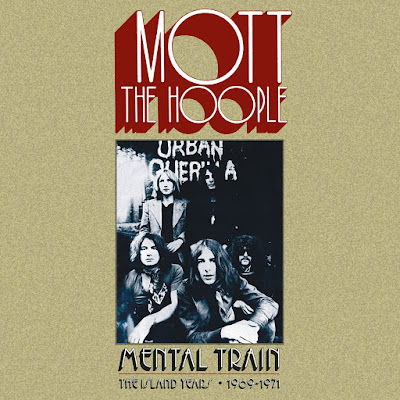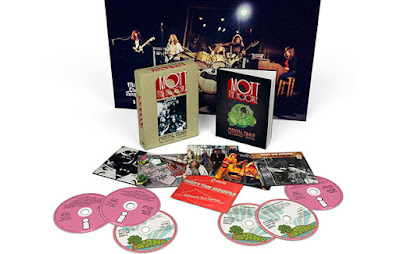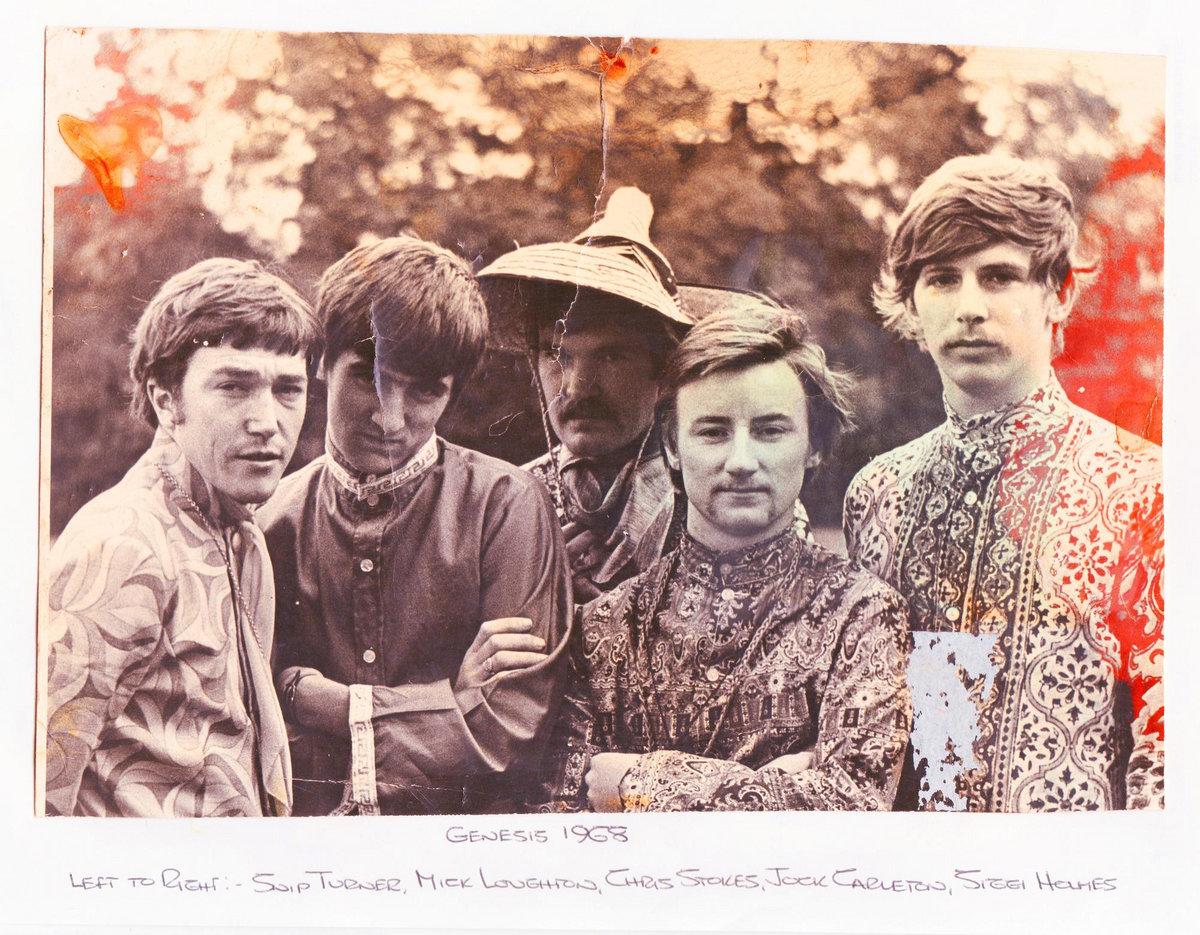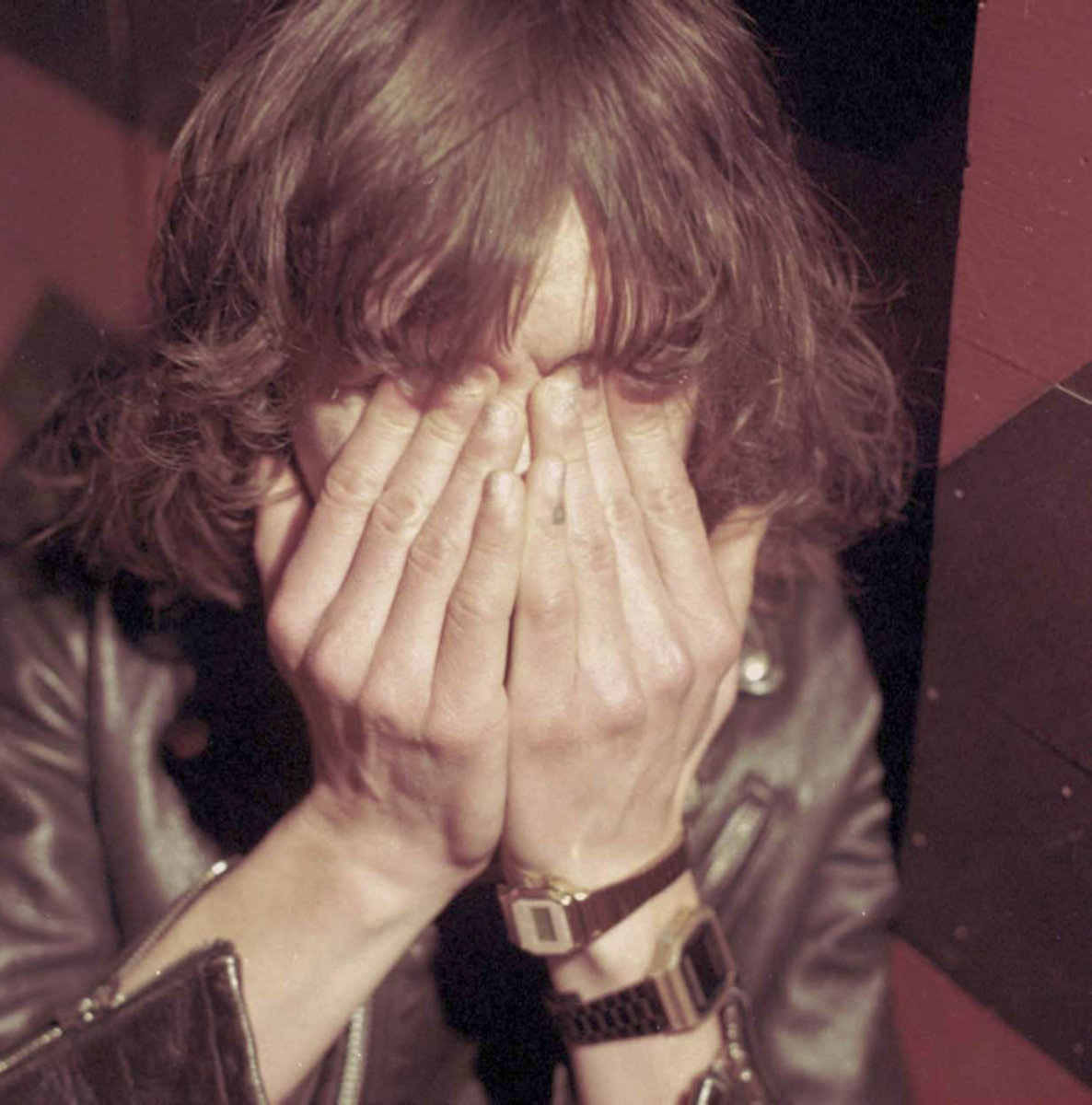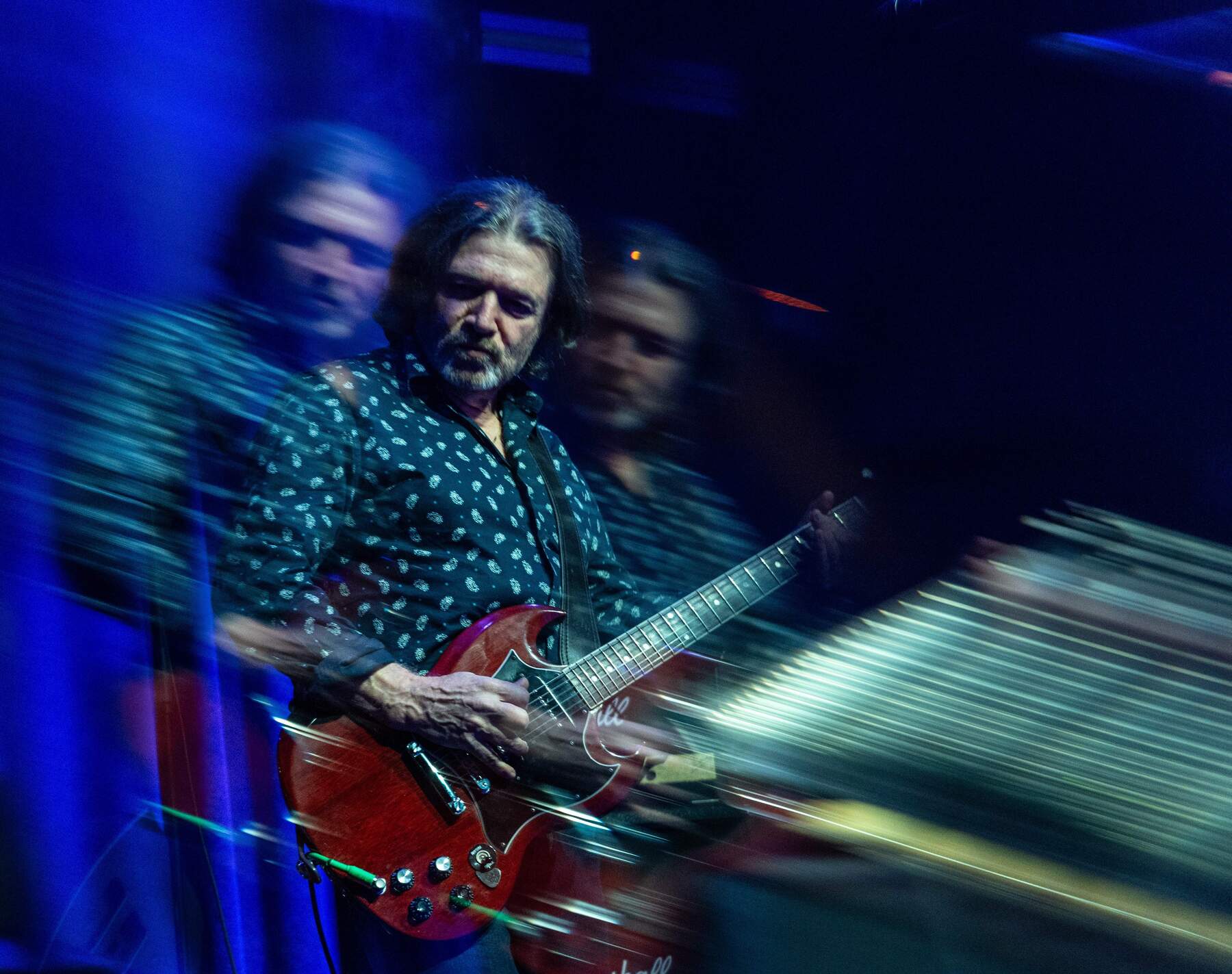Mott The Hoople – “Mental Train-The Island Years 1969-71” (2018) review
Mott The Hoople – Mental Train-The Island Years 1969-71 (Universal Music, 2018)
A rather enigmatic British rock band who recorded seven studio albums and one live LP between 1969 and 1974, Mott The Hoople were always recognized as an incredibly original sounding band despite the fact that many of their best performances were covers of songs written by artists ranging from Bob Dylan and David Bowie to Sonny Bono and Doug Sahm. The groups’ career was split into two periods, their early years on Chris Blackwell’s Island Records and their later tenure spent at CBS Records. None of the four studio albums and three singles appearing on Island chartered on either side of the pond, but arguably contain their finest recordings, with a rawer, more varied sound. Universal Recordings celebrates their Island catalog with the incredible six disc, eighty nine track box set “Mental Train” which contains no less than thirty previously unreleased tracks. The set’s contents are thematic, with one devoted to each of their four albums released on the label, all generously supplemented by bonus material, another titled “The Ballads Of Mott The Hoople” containing rare or unreleased studio tracks and the collection rounded out by “It’s Live And Live Only” comprising six cuts from a 13th September 1970 gig at Fairfield Hall in Croydon, and six more tunes from a 30 December , 1971 BBC Radio 1 “In Concert” show. The box set showcases the instrumental talent of the group’s original quintet and presents a wonderful mix of original tunes and cover versions which the band invariably made their own.
Disc one is based around the the group’s 1969 s/t debut LP, with nine bonus tracks added. The album opens with an incendiary, Mick Ralphs guitar driven instrumental cover of The Kinks’ “You Really Got Me” which was an integral part of the band’s live repertoire, and while edited down to just under three minutes here, the song was often extended to as long as thirty minutes live, and in fact an eleven minute version is included as a bonus cut as is a rare vocal version produced by the late Guy Stevens, known for his work with bands such as Free and Hapsash and The Coloured Coat. The group’s mellower side is apparent with their laid back cover of Doug Sahm’s “At The Crossroads” with Ian Hunter’s vocals and Verden Allen’s organ mixed to the fore. A take on Sonny Bono’s “Laugh At Me” with Hunter and Allen’s efforts joined by some fiery guitar work by Ralphs, runs six and a half minutes and is a fine example of the instrumental prowess of Mott with Ralphs’ extended solo playing the song out in fine fashion. Hunter’s “Backsliding Fearlessly” the title track of a 1994 Rhino compilation of Mott’s Island Years makes Dylan’s influence obvious with Hunter’s piano the lead instrument. Mick Ralphs’ “Rock And Roll Queen” is an infectious rocker with Ralphs’ guitar and Hunter’s vocals at the helm from the get go. The five minute plus LP version features more white hot guitar from Ralphs and an unforgettable riff. The tune is included in three additional versions, a three and a half minute single take that sounds like a sure fire hit which somehow failed to catch record buyer’s fancies, a five and a half minute “kitchen sink instrumental” version, which lives up to its title thanks to more impressive guitar work by Ralphs, and a live take from the 1970 Croydon gig. The short, two minute, “Rabbit Foot And Toby Time” is another Ralphs composition featuring his blazing guitar. The ten and a half minute “Half Moon Bay” co-written by Ralphs shows the many sides of the band with Ralphs’ guitar and Allen’s organ pushing the beat while Hunter supplies his typically Dylanesque vocals reminiscent of “Highway 61 Revisited.” A piano and organ interlude by Hunter and Allen gives the tune a regal sound which evolves into swirling organ before Ralphs’ guitar once more takes charge, the tune ending in, a crescendo of guitar, piano, organ and Hunter belting out the vocals. The album’s closer “Wrath And Roll” is a snappy, minute and forty five seconds of madness with Ralphs’ fuzzed out guitar swirling, Dale “Buffin” Griffin pounding his drums and Allen’s organ adding texture, the result an iconic Guy Stevens inspired bit of insanity. The bonus material begins with a cover tune bearing a typically off the wall MTH title, “If Your Heart Lay With The Rebel (Would You Cheer The Underdog)” featuring more stinging guitar from Ralphs and regal organ from Allen filling its four minute run time. Ralphs’ soaring solo is especially impressive as he does a call and response with Allen’s Hammond Organ, the band once again proving it could rock with a capital R. The single edit of “Rock And Roll Queen” features its familiar chorus of “You’re Just A Rock And Roll Queen And I’m Just A Rock And Roll Star” which seems so natural for Hunter to sing, and Ralphs’ climbing guitar. Hunter’s “Road To Birmingham” issued as the b-side to “Rock And Roll Star” brings the listener back to earth with Allen’s organ and Hunter’s piano leading the way and Hunter repeating the familiar chorus “Birmingham, Birmingham underneath your face there’s nothing but a space-you’re hollow.” The tune is also presented in its Guy Stevens produced version which features Hunter’s piano front and center and sitaresque guitar by Ralphs. The eleven minute full take of “You Really Got Me” spotlights Ralphs and Allen yet again, especially the extended Hammond solo by Allen, as Ralphs’ fuzzed out guitar and Hunter’s pounding piano join in. The vocal version of “You Really Got Me” features Mick Ralphs on lead vocals and lead guitar and definitely holds its own against The Kinks’ original. The Guy Stevens mix of “Rock And Roll Queen” is a bit sparser than the other mixes, with its guitar reminiscent of Paul Kossoff, while the Kitchen Sink instrumental take of “Rock And Roll Queen” is filled with Hunter’s piano and Allen’s organ and of course Mick Ralphs’ guitar, but sounds much rawer than the other versions. The disc closes with Hunter’s “Little Christine” a mid-tempo number with tasteful, yet restrained guitar from Ralphs and Hunter’s vocals heavily echoed, and deeper in the mix as Ralphs’ guitar and Allen’s organ drive the beat. Ralphs’ lead guitar may be restrained but still packs plenty of punch.
Disc two is centered around Mott’s 1970 LP “Mad Shadows” which, like its predecessor was produced by Guy Stevens. The album opens with one of the band’s better known numbers, “Thunderbuck Ram” a deceptively heavy tune which opens with gentle guitar and keyboards before Ralphs’ guitar catches fire. A mid tune interlude slows the tempo, led by Hunter’s piano before Ralphs’ returns with a rage. “No Wheels To Ride” begins as a mid-tempo Hunter ballad with Allen’s keyboards mixed to the fore and a deceptively heavy Ralphs riff added for good measure, leading up to a gorgeous solo, with bassist Overend Watts and drummer Griffin’s bottom end more evident than on other tunes. Hunter’s “You Are One Of Us” has a gentle piano intro before Ralphs’ stinging lead guitar makes its entrance with a gorgeous chorus of backing vocals behind Hunter and featuring yet another massive Ralphs solo. The band’s rock roots are present from the opening note of Hunter’s “Walkin’ With A Mountain” with Ralphs’ Chuck Berry style guitar and Hunter’s pounding piano joining the latter’s shouted vocals. The seven minute plus “I Can Feel” slows the pace a bit with Hunter and Allen’s keyboard intro, and the tune’s sound is complemented by female backing vocals, with Ralphs adding a tastefully restrained lead line with his understated solo playing the song out. Ralphs’ “Threads Of Iron” opens as a mid-tempo number with haunting vocals by the guitarist, the pace quickening with Ralphs’ fiery guitar and Hunter’s pounding piano, as Watts’ thundering bass and Griffin’s attack on his drum kit lead the way to Ralphs’ solo outro. The album closes with Hunter’s cerebral, introspective “When My Mind’s Gone” whose topic is a recurrent theme in Mott’s discography. The song’s lovely melody is supplied by Hunter and Allen’s gentle piano and organ respectively. A BBC recording of “Thunderbuck Ram” is erroneously introduced as being penned by band “organist” Mick Ralphs but rocks from the get go with Hunter screaming his vocals over Ralphs’ lead line and solo, and Verden Allen’s organ solo closing the tune. An interesting demo of “No Wheels To Ride” is followed by the previously unreleased “Moonbus (Baby’s Got A Down On Me)” with Allen’s organ dominating the sound until Ralphs’ guitar enters mid-tune roaring as he delivers another red hot solo. An interesting vocal rehearsal of “The Hunchback Fish” precedes an alternate take of “You Are One Of Us.” “Going Home” has a T.Rex feel with Ralphs’ solo roaring and soaring. A short studio take on Little Richard’s “Keep A Knockin’” is rather loyal to the original recording despite a stunning guitar solo by Ralphs.
1971’s “Wildlife” is the subject of disc three and is markedly different from the first two LP’s with its gentler, rather country rock influenced sound.. Ralphs’ “Whiskey Women” is an interesting mix of the kinder, gentler Mott sound mixed with stinging lead guitar from Ralphs and a tasty Allen organ solo. Hunter’s “Angel Of Eighth Avenue” is a mid-tempo country folk rocker featuring understated guitar and organ. “Wrong Side Of The River” has a Neil Young feel with Ralphs’ restrained guitar and vocals as well as a Hunter piano solo. “Waterlow” features strings and Hunter’s piano, its delicate melody rendering a mournful, dirgish vibe. The highlight of the album may well be a wonderful cover of Melanie Safka’s “Lay Down” with its choral vocals and the peace and love message that had been immortalized by Melanie at Woodstock. Mott The Hoople’s version features Hunter and Allen on piano and organ. Must Be Love” reinforces the country influence with its steel guitar and Ralphs’ vocals. “Original Mixed Up Kid” continues the country vibe with vocals shared by Hunter and Ralphs and more steel guitar. “Home Is Where I Want To Be” is a rockier number although it is dominated by restrained piano, organ and acoustic guitar, an interesting album closer. The bonus cuts begin with a ten minute live cover of Little Richard’s “Keep A Knockin’” recorded at Fairfield Hall, Croydon, a gig featured prominently on disc six of this set. The crowd obviously enjoys the band’s performance as they go into jam mode with Allen’s organ and Hunter’s piano joining the locked in, booming rhythm section of Watts and Griffin, with Ralphs’ solo definitely the highlight. The band nicely works Jerry Lee Lewis’ “Whole Lotta Shakin’ Goin’ On” and Ray Charles “What’d I Say” into their extended arrangement. Although the track listing indicates the single a-side “Midnight Lady” follows, it is actually a demo version with guide vocals that nonetheless features an impressive solo by Ralphs. The non-LP b-side “The Debt” has Dylanesque vocals by Hunter and delicate acoustic guitar by Ralphs, as the band shows its relaxed side. An interesting choice for the a-side of a single, Mott’s cover of Crazy Horse’s “Downtown” continues the country rock feel of “Wildlife” with Ralphs’ stabbing, yet understated guitar work unquestionably the highlight. A demo titled “Brain Haulage,” an early version of “Whiskey Women” contains excellent guitar courtesy of Ralphs and sounds good enough to be a finished track. “Growing Man Blues” has an impressive fuzz guitar intro with Buffin’s drums and percussion prominently featured, although it is Ralphs’ massive guitar solo that shines brightest. The song certainly sounds finished and deserving of release but must have varied too much from the tone of “Wildlife” for inclusion. A demo of “Long Red” is another rocker, with Ralphs’ white hot guitar joined by Allen’s organ, the former delivering two impressive solos. Again, the song must have been deemed too heavy to include on the album. The previously unreleased “The Ballad of Billie Joe” is a nice song sketch, a mid-tempo rocker with guide vocals by Hunter. The disc closes with an extended demo of “Lay Down” with Hunter and Allen to the fore, appearing with guide vocals by Hunter but lacking Ralphs’ lead guitar contributions.
The band’s final Island album, 1971’s “Brain Capers” is the centerpiece of disc four and marks a return to a rockier, more hard-edged sound. Allen’s organ and Ralphs’ guitar dominate “Death May Be Your Santa Claus” a catchy tune with definite possibilities had it been released as a single and to my ear is indicative of classic Mott The Hoople. A cover of Dion Dimucci’s “Your Own Backyard” is another interesting choice for recording by the band with its gritty subject of life on the streets, drug addiction and its reference “I’m still crazy as a loon.” The highlight of the album and perhaps of all the band’s recordings at Island is an incredible cover of Jesse Colin Young’s “Darkness, Darkness” originally recorded by Young’s band The Youngblood’s best known for their smash hit cover of Dino Valenti’s “Get Together.” The song opens with Ralphs’ fiery guitar intro and features gorgeously echoed vocals. The tune’s tone escalates thanks to Ralphs’ wah wah work and roaring solo leading to its swirling guitar outro. The arrangement fits the band perfectly and deserved FM radio airplay if not AM single release. “The Journey” is an incredible introspective ballad, written by Hunter and harkens back to “When My Mind’s Gone” with its look at life’s darker side and reference to suicide with Hunter’s piano interlude fitting the song’s mood perfectly, before Ralphs’ solo soars above the mix driving the song home. “Sweet Angeline” is a mid-tempo rocker. Ralphs’ lead line is restrained as Hunter screams his vocals before Ralphs delivers an absolute top drawer solo. Allen’s “Second Love” is a gentler, keyboard oriented song with Ralphs’ guitar ever present, yet restrained, with horns added for texture. “The Moon Upstairs” opens with heavy guitar from Ralphs, a la Deep Purple, the heavy riff building thanks to Watts and Griffin, as Allen supplies a spicy organ solo and Ralphs yet another jaw dropping guitar solo, leading to a feedback laden outro. The album closes with a one minute ditty courtesy of Guy Stevens and Ian Hunter, with Hunter babbling nearly incoherent lyrics over the band roaring in jam mode. “Mental Train” the title track of this set, an alternate version of “The Moon Upstairs” is a bit longer than the released version and features a wonderfully distorted guitar solo by Ralphs. “How Long,” an alternate version of “Death May Be Your Santa Claus” is a bit slower and shorter than the released version but is nonetheless nicely delivered. A considerably shorter alternate take of “Darkness, Darkness” still packs plenty of punch, with Ralphs’ guitar the center of attention. The alternate take of “Your Own Backyard” is nearly indistinguishable from the released version, but included for completeness. A demo of “Where Did You All Come From” a previously unissued song, features the backing track without vocals, giving insight into the building of tunes by the band. An unreleased tune “One Of The Boys” is presented in scratch track version with gorgeous acoustic guitar. The song was later revisited and released by the band after they had moved to CBS Records. Mick Ralphs’ “Movin’ On” taken from the “2 Miles From Heaven” posthumous retrospective, is a crisp, light rocker with gorgeous organ by Allen dominating, and was later re-recorded and released by Ralphs after he had joined ex-Free vocalist Paul Rogers in Bad Company. The disc closes with another track from the “2 Miles” collection “Black Scorpio (Momma’s Little Jewel)” a tasty rocker showcasing Ralphs’ guitar which was re-recorded and released by the band after their move to CBS. The version found here sounds finished and would’ve fit “Brain Capers” nicely, leaving one to wonder why it wasn’t, while serving as a reminder of how much quality material the band recorded in their short, two year, stay at Island.
Disc five titled “The Ballads Of Mott The Hoople” opens with a partial take of Bob Dylan’s “Like A Rolling Stone” featuring piano and vocals by Hunter. A live eight minute take of “No Wheels To Ride” recorded at the 1st House Fairfield Halls, begins with gentle piano and organ by Hunter and Allen, the tempo building until Ralphs steps up and cuts loose, his solo soaring to the song’s end. A version of “Angel Of Eighth Avenue” mastered from folds up multi-tracks extends the released track and includes studio banter. An alternate take of “The Journey” is as gorgeous as the released version featuring Hunter’s piano and swirling Hammond organ by Allen, with Ralphs’ lead guitar absent until near the song’s end as it plays the song out. “Blue Broken Tears” has a Neil Young “Harvest” vibe and features gentle piano by Hunter and gorgeous vocals by Ralphs. The unreleased Ralphs tune “Black Hills” is a beautiful acoustic number showcasing him on guitar. The longest track on the set at nearly sixteen minutes, Hunter’s “Can You Sing The Song That I Sing” opens with piano before the beat quickens as Hunter contributes a gorgeous piano solo, with Ralphs’ acoustic guitar overdubbed with gentle electric, and Allen’s organ accompanying. A bit over ten minutes in the tempo quickens but quickly slows back down as the tune remains restrained throughout. “Till I’m Gone” is a relaxed tune taken from “2 Heavens” featuring Ralphs on guitar and vocals. The BBC recording of “The Original Mixed Up Kid” is a three minute Dylanesque tune with gentle acoustic guitar, piano, organ and vocals, with a Ralphs solo outro. “Wind Blowing” is a delicate number featuring Hunter on piano and vocals. The nearly eleven minute rehearsal of “I’m A River” is a keyboard driven tune with studio chatter as the band discusses working out the arrangement. “Ride On The Sun (Sea Diver)” also from the “2 Heavens” cassette is an early version of a song that would be revisited and released by the band on CBS.
The sixth and final disc “It’s Live And Only Live” features six tracks recorded at Fairfield Hall, Croydon on 13 September 1970 and six recorded for BBC Radio 1’s “In Concert” on 30 December 1971. The Croydon tracks open with a hot rocking take on “Rock And Roll Queen” with Ralphs showing off his guitar chops, pushing the beat until he cuts loose with an extended solo that plays the song out. The band’s cover of Neil Young’s “Ohio” is true to the C,S,N&Y original with Ralphs guitar dominating. He delivers a gorgeous solo as the band jams raucously throughout. An eight minute medley combines band original “No Wheels To Ride” with the Lennon/McCartney penned “Hey Jude.” The band delivers as Hunter’s gentle tune segues effortlessly into The Beatles classic tune. “Thunderbuck Ram” opens deceptively gently, then its tempo quickens and Ralphs’ guitar warms up, an Allen organ interlude giving way to Ralphs’ fiery guitar finish. The seven minute “Keep A Knockin’” features the band in a heavy groove, with Ralphs’ guitar rather than Hunter’s piano dominating. As usual Jerry Lee Lewis’ “Whole Lotta Shakin’ Goin’ On” and Ray Charles’ “What’d I Say” are worked into the arrangement and the tune closes with call and response vocals between the band and the audience. The show stopping, ten minute instrumental take on The Kinks’ “You Really Got Me” is presented as an encore, with Ralphs’ incendiary guitar roaring throughout, nicely supplemented by Allen’s organ, the band’s sound blazes, building to a feedback drenched crescendo. The “In Concert” recordings begin with a six minute “The Moon Upstairs” a hot rocker with Mick Ralphs’ guitar in charge from start to finish. “Whiskey Women” another Ralphs guitar track, finds his work understated, with Allen’s organ to the fore. A five minute take on Dion’s “Your Own Backyard” features Ralphs on slide guitar complemented by Allen’s organ as Hunter sings the sad tale of a junkie’s life. In comparison to the studio version Ralphs’ guitar is much heavier here. An extended seven and a half minute cover of “Darkness, Darkness” is evidence of the band making it their own as the song builds with acoustic guitar and vocals giving way a little over two minutes in when Ralphs’ guitar soars with Allen’s organ, leading to a fiery Ralphs solo. The tempo slows as the tune moves to Hunter’s vocals and Allen’s organ before Ralphs’ guitar returns to play the song out. An eight and a half minute version of “The Journey” has the band toning it down, dominated by piano and organ, as loyal to the LP version Ralphs’ guitar is restrained until mid-tune when the tempo builds to a heavy riff, with Ralphs soloing the final minute and a half of the song, although not at full throttle. The concert, and box set, close with a five minute take on “Death May Be Your Santa Claus” with the band letting it all hang out, settling into a heavier groove than on album with Allen’s organ the focus. Again Ralphs’ lead line is beefy but not full out as the lyric “how long” is repeated over and over, the band rocking, but always under control as the tune draws to an end.
“Mental Train: The Island Years 1969-1971” comes in a lift lid box, with each of the six discs, nearly seven and a half hours of music, housed in their own cardboard mini-LP sleeves. A large poster of the band joins the 52 page full color hardback book which includes an extended essay by Kris Needs, track by track annotations, photos of the band, album artwork, posters, press clippings and other memorabilia. The box set was compiled by Mott The Hoople expert Campbell Devine with assistance from Kris Needs. The sound is immaculate, being mastered by Andy Pearce and Matt Wortham. “Mental Train” is the last word on Mott The Hoople’s years at Island Records and will appeal to those already familiar with the band as well as any fan of classic rock of the late 1960’s and early 1970’s. The set comes most highly recommended with the one caveat that the single version of “Midnight Lady” is not to be found here and it is unclear as to whether Universal will issue a replacement disc or not. The track is available elsewhere, but let the buyer be forewarned not to discard releases such as “The best Of The Island Years 1969-1972” which does indeed include the single version of the song.
– Kevin Rathert
© Copyright http://www.psychedelicbabymag.com/2019
Array

